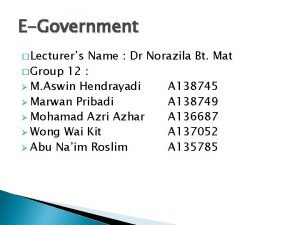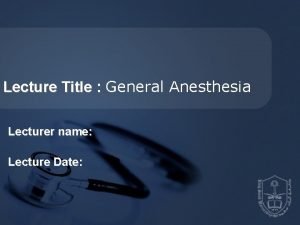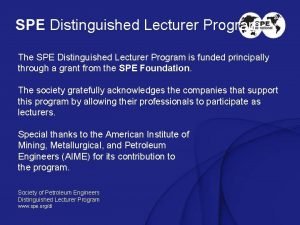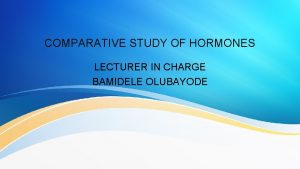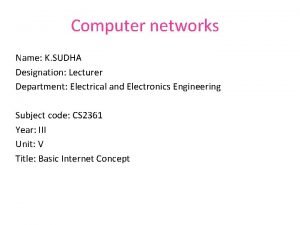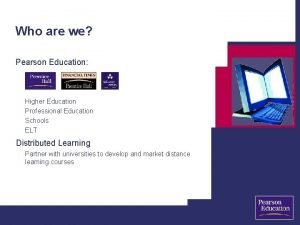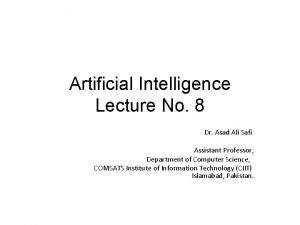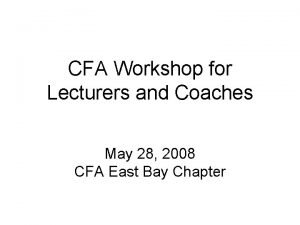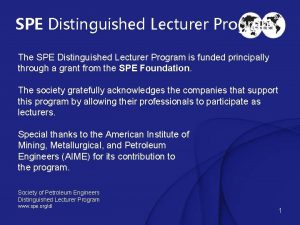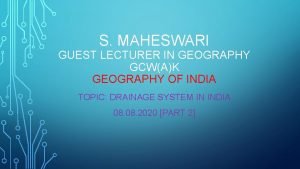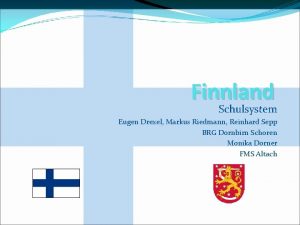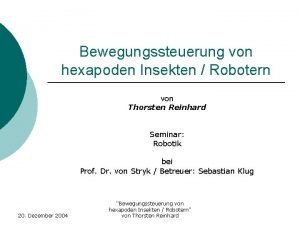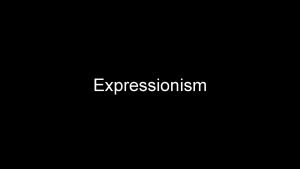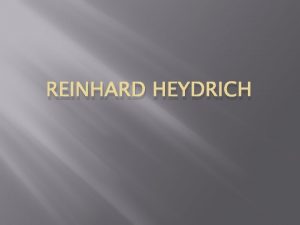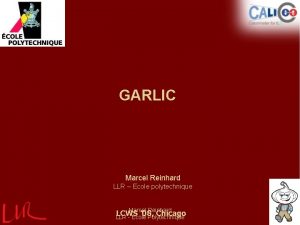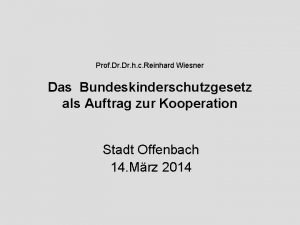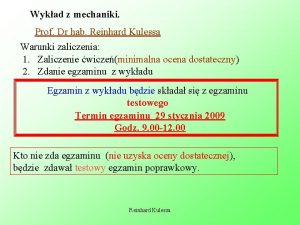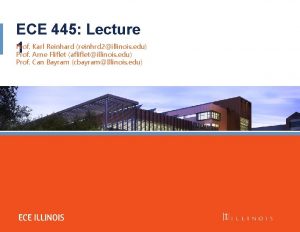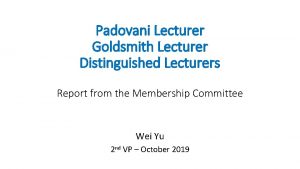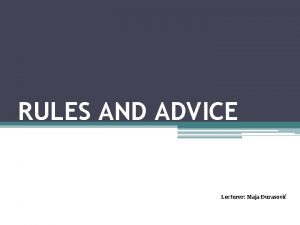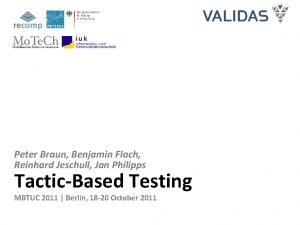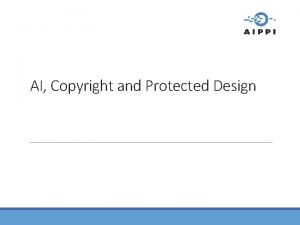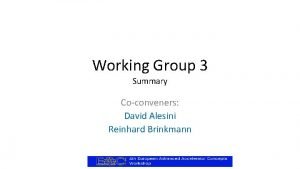1 We Lecturer Prof Reinhard von Hanxleden R














![[U. S. Naval Historical Center Online Library] Page from the Harvard Mark II electromechanical [U. S. Naval Historical Center Online Library] Page from the Harvard Mark II electromechanical](https://slidetodoc.com/presentation_image_h2/e4e8f5b54c9091ed2597cb26e4b5b23d/image-15.jpg)







![The Java Interpreter source file public class Hello { public static void main(String[] args) The Java Interpreter source file public class Hello { public static void main(String[] args)](https://slidetodoc.com/presentation_image_h2/e4e8f5b54c9091ed2597cb26e4b5b23d/image-23.jpg)

- Slides: 24

1

We Lecturer: Prof. Reinhard von Hanxleden, R 1117, rvh@informatik. uni-kiel. de Staff (Mitarbeiter/innen): Christoph Daniel Schulze (lead), R 1112, cds@ Steven Smyth, R 1118, ssm@ Nis Wechselberg, R 1112, nbw@ Alexander Schulz-Rosengarten, R 1113, als@ Sören Domrös R 1113, sdo@ Student Staff (Hilfskräfte): Lukas Bartschat Jeremia Böhmig Leonie Krull Vincent Shariyari Massoud Johanna Menzel Patrick Michalski Jette Petzold Tim Weißenfels 2

I: • • • Code of Conduct Start and finish on time Try to deliver high-quality lectures Listen to your concerns Make sure you have a fair chance of passing this class Prepare you for what's ahead You: • Are punctual • Do not disturb others (no chatting, no laptops/tablets/. . . ) • Work on problems yourself (no plagiarism/code sharing) • Check your schedule before registering your timepreferences for the practical class • Familiarize yourself with infprogoo. de and the linked wiki, including requirements for "Endklausurzulassung" 3

Literature • "The Art and Science of Java, " by Eric Roberts • "Java ist auch eine Insel, " by Christian Ullenboom • See also wiki �Begleitmaterialien 4

// Problem: int color_out = 4096 / (256 / color_in); // Solution: int color_out = color_in << 4; 5

Programming – Lecture 1 Welcome Administrivia Introduction (Chapter 1) • Brief history of computing • CS, Algorithms, SW Engineering, Errors • Compilation vs. Interpretation 6

Introduction (Chapter 1) Brief history of computing CS, Algorithms, SW Engineering, Errors Compilation vs. Interpretation 9

A Brief History of Computing Image courtesy of Eric Roberts 11

Charles Babbage (1791 – 1871) Images courtesy of Eric Roberts Augusta Ada Byron, Lady Lovelace (1815 – 1852) 15

CC BY-SA 3. 0 Z 1 CC BY-SA 3. 0 Konrad Zuse (1910 – 1995) 16

Computer Science The science of problem solving in which the solutions happen to involve a computer Solving a problem by computer: 1. Algorithmic design 2. Coding 19

Algorithm Ninth-century Persian mathematician Abu Ja‘far Mohammed ibn Mûsâ al-Khowârizmî Properties: 1. Clearly and unambiguously defined 2. Effective 3. Finite 21

Software Engineering Discipline of writing programs so that they can be understood and maintained by others 22

Programming Errors Distinguish • Syntax errors • Bugs „The first step [in all of my inventions] is an intuition, and comes with a burst, then difficulties arise – this thing gives out and [it is] then that ‘Bugs’ – as such little faults and difficulties are called – show themselves […]. “ Thomas Edison, 18 Nov 1878 24
![U S Naval Historical Center Online Library Page from the Harvard Mark II electromechanical [U. S. Naval Historical Center Online Library] Page from the Harvard Mark II electromechanical](https://slidetodoc.com/presentation_image_h2/e4e8f5b54c9091ed2597cb26e4b5b23d/image-15.jpg)
[U. S. Naval Historical Center Online Library] Page from the Harvard Mark II electromechanical computer's log, 1947 25

Why Java in Inf. Prog. OO? • First of all: why ask that question? This class is about programming principles, not about a particular programming language. • Having said that: to really learn the principles, one should write real programs, for which a concrete language X must be chosen. • Choice of X should be guided by a few questions. . . 26

Questions to Ask Concerning X 1. Does X illustrate imperative/object-oriented programming? 2. Is it reasonably easy to learn X, are there good resources available for learning X? 3. Does the teaching staff have good expertise on X? 4. Do later classes and software projects at CAU also use X? 5. Does knowledge of X help me after graduation? Clear “yes” to all of these for X = Java. 27

www. tiobe. com

See also http: //www. tiobe. com/tiobe-index/programming-languages-definition/ 29

Java – the undisputed winner Java still continues to top the most popular programming languages charts as it did a year ago. According to TIOBE’s data, Java has secured the first and second positions more than any other languages for about a couple of decades. A large number of renowned companies use Java to develop software and applications so if you happen to know Java, you definitely won’t have to struggle to find a job. The major reasons behind the popularity of Jave are its portability, scalability and a large community of users. https: //fossbytes. com/most-popular-programming-languages/ June 2018 30

Java – Design Goals • • • Simple, object oriented, familiar Robust, secure Architecture neutral, portable High performance Interpreted, threaded, dynamic White Paper: The Java Language Environment James Gosling and Henry Mc. Gilton, May 1996 31

Classic Compilation Process source file #include <stdio. h> gcc hello. c int main() { printf("hellon"); } object file 0100100101011001000010100011101011 0110100111010101100 a. out compiler executable file linker 0100100101011001000010100011101011 0110100111010101100 10010110001011 01001001011011 01011010100101 other object files and libraries 10010110001011 01001001011011 01011010100101 Graphic courtesy of Eric Roberts 32
![The Java Interpreter source file public class Hello public static void mainString args The Java Interpreter source file public class Hello { public static void main(String[] args)](https://slidetodoc.com/presentation_image_h2/e4e8f5b54c9091ed2597cb26e4b5b23d/image-23.jpg)
The Java Interpreter source file public class Hello { public static void main(String[] args) { System. out. println("hello"); } } javac Hello. java CA 00 00 01 class file FE 16 04 00 BA 07 00 16 BE 00 07 2 B 00 1 A 0 C 4 C Hello. class 03 07 00 6 A 00 00 13 61 compiler archive JAR archive CA 00 00 01 47 2 D 14 00 FE 16 04 00 72 00 0 A 18 BA 07 00 16 61 1 F 00 0 C BE 00 07 2 B 70 08 02 00 00 1 A 0 C 4 C 68 00 00 17 03 07 00 6 A 69 0 F 08 00 00 00 13 61 63 07 0 A 1 C other class files 47 2 D 14 00 72 00 0 A 18 61 1 F 00 0 C 70 08 02 00 68 00 00 17 69 0 F 08 00 63 07 0 A 1 C JVM java Hello hello Graphic courtesy of Eric Roberts 33

Summary • Long history of computing, recent acceleration • Defined “CS”, “Algorithm”, “SW Engineering” • Syntax errors vs. Bugs • Discussed Java design goals • Compilation vs. Interpretation 37
 Lecturer's name or lecturer name
Lecturer's name or lecturer name Lecturer name
Lecturer name Spe distinguished lecturer
Spe distinguished lecturer Lecturer in charge
Lecturer in charge Designation lecturer
Designation lecturer Pearson lecturer resources
Pearson lecturer resources Good afternoon class
Good afternoon class Lecturer asad ali
Lecturer asad ali Cfa lecturer handbook
Cfa lecturer handbook Designation of lecturer
Designation of lecturer 140000/120
140000/120 Photography lecturer
Photography lecturer Why himalayan rivers are pernnial in nature
Why himalayan rivers are pernnial in nature Physician associate lecturer
Physician associate lecturer Lector vs lecturer
Lector vs lecturer Lecturer in charge
Lecturer in charge Reinhard f. werner
Reinhard f. werner Reinhard gogola
Reinhard gogola Reinhard sepp
Reinhard sepp Reinhard edeler
Reinhard edeler Thorsten reinhard
Thorsten reinhard Reinhard mey zeugnistag text
Reinhard mey zeugnistag text Miriam busse
Miriam busse Dr reinhard schlemmer
Dr reinhard schlemmer Schpp
Schpp
